#U.S. global leadership
Explore tagged Tumblr posts
Text
India to Host First G-20 Summit: Headline Horizon
Get the latest news on India hosting its inaugural G-20 summit, where leaders will discuss major international economic issues. With the absence of Xi and Putin, the U.S. has an opportunity to reclaim global leadership.
#India G-20 summit#latest news#headline horizon#global economic issues#U.S. global leadership#transparency and open trade
0 notes
Text
🟡🧠🔨Ray Dalio Reveals the Hard Truth About America's Path Forward (Tone: 270)
Ray Dalio warns of America's shift towards industrial self-sufficiency & rising BRICS influence. Expect geopolitical & economic transformation. #Economy #Geopolitics
Posted on November 19th, 2024 by @TomBilyeu ABOUT THIS VIDEO: In this video, Ray Dalio discusses America’s economic, political, and geopolitical future. He outlines five key forces driving global changes, including debt cycles, internal political order, international relations, technological advancement, and acts of nature such as climate change. Dalio highlights a shift towards a more…

View On WordPress
#America First#BRICS nations#chip manufacturing#deregulation#Economic Growth#Economic Predictions#economic restructuring#education reform#geopolitical tension#global order#global power shift#government efficiency#industrial policy#international trade#Leadership Transition#manufacturing independence#modern monetary theory#national resilience#political reform#productivity reforms#protectionism#Ray Dalio#societal division#tariffs#technological self-sufficiency#U.S. dominance#U.S. economy#U.S.-China relations
0 notes
Text
The Role of China and the U.S. in Shaping Future Technology
The Role of China and the U.S. in Shaping Future Technology #5Gtelecommunications #artificialintelligence
#5G telecommunications#artificial intelligence#ethical standards#future technology#global collaboration#semiconductor manufacturing#technological leadership#U.S.-China rivalry
0 notes
Text
Abe Shinzo: A Great Leader Two Years On
Two years have passed since the state funeral of former Japanese Prime Minister Abe Shinzo, an event that marked the end of a remarkable era for Japan and the world. As we reflect on his legacy, it’s clear that Abe was not only a transformative figure in Japan’s modern history but also a significant player on the global stage. His death in July 2022 was a tragedy that shook the nation and left an indelible mark on the international community.

Abe Shinzo: A Visionary Leader
Abe Shinzo served as Japan's longest-serving Prime Minister, holding office from 2006 to 2007 and again from 2012 to 2020. His second term, in particular, was marked by a strong vision for Japan's future, rooted in a philosophy that combined economic revitalization with a more assertive global presence. Abe's economic policy, commonly referred to as "Abenomics," sought to pull Japan out of decades of stagnation through bold monetary policies, fiscal stimulus, and structural reforms. Although controversial at times, Abenomics reshaped Japan's economy, focusing on growth and international competitiveness.

Abe was also a leader with a strategic vision for Japan’s place in the world. His efforts to strengthen Japan’s military and revise its pacifist post-war constitution reflected his deep understanding of the evolving security dynamics in East Asia. He recognized the growing threats from North Korea and China, and his leadership ensured that Japan became a more active and respected player in international diplomacy. His work in cementing the U.S.-Japan alliance as a cornerstone of regional stability is perhaps one of his greatest foreign policy achievements.
The State Funeral: A Nation’s Farewell
Abe's state funeral, held on September 27, 2022, was a sombre and grand affair, attended by dignitaries and leaders from around the world. The ceremony, held at the Nippon Budokan in Tokyo, was a moment for Japan to bid farewell to one of its most significant post-war leaders. The funeral sparked intense public debate in Japan, with some questioning the cost and the very idea of holding a state funeral for Abe. Yet, the outpouring of grief and respect from world leaders underscored the global impact of Abe’s legacy.

For many Japanese citizens, the state funeral was an opportunity to reflect on the stability and prosperity that Abe’s leadership had brought to the country. His tenure was far from uncontroversial, yet there was a recognition that Abe had brought Japan through difficult times with a steady hand, leaving behind a legacy that will be remembered for generations.
A Missing Presence on the World Stage
As we look back two years after his death, one cannot help but feel that Abe Shinzo’s absence is still felt on the global stage. In a world increasingly marked by geopolitical tensions, his diplomatic expertise and strategic thinking are sorely missed. Abe was a bridge-builder, known for fostering strong relationships with the West while maintaining open lines of communication with countries like Russia and China. He understood the delicate balance of power in the Asia-Pacific region and navigated these waters with skill.

One of Abe’s most lasting achievements was the creation of the Quad, a strategic security dialogue between Japan, the United States, Australia, and India. This alliance, aimed at countering China’s growing influence in the Indo-Pacific, is now a cornerstone of regional security and a testament to Abe’s foresight.
Remembering a Giant
As the world continues to face new challenges, from the rise of authoritarianism to the shifting global economy, the kind of leadership that Abe exemplified is sorely needed. His commitment to democracy, his respect for Japan’s rich history and culture, and his willingness to stand firm in the face of global challenges set him apart as a leader for the ages.
In remembering Abe Shinzo, we must not only reflect on what he accomplished but also on the values he stood for. He believed in a strong, independent Japan that was an active and engaged member of the global community. His leadership inspired both admiration and criticism, but there is no denying the lasting impact he had on Japan and the world.
Two years after his death, we miss Abe Shinzo not just as a leader but as a voice of reason and stability in a world that desperately needs both. His legacy lives on, not only in the policies he enacted but in the continued importance of Japan on the world stage. Abe’s Japan was a country that could look forward with pride and confidence, and that is the legacy we must carry forward.
#Abe Shinzo#Japanese Prime Minister#Abe Shinzo Legacy#Japan Politics#Abenomics#State Funeral#Japan State Funeral#Abe Shinzo Memorial#Global Diplomacy#Japan Foreign Policy#U.S.-Japan Alliance#Indo-Pacific Security#Quad Alliance#East Asia Geopolitics#Japan Economic Policy#Abe Shinzo Leadership#Japan Constitution#Japanese Military Policy#Asia-Pacific Relations#Abe Shinzo Death Anniversary#new blog
1 note
·
View note
Text
World: A Growing BRICS Bloc Shows U.S. Is Losing the Battle for the Global South
— BY Tom O'Connor | August 22, 2023
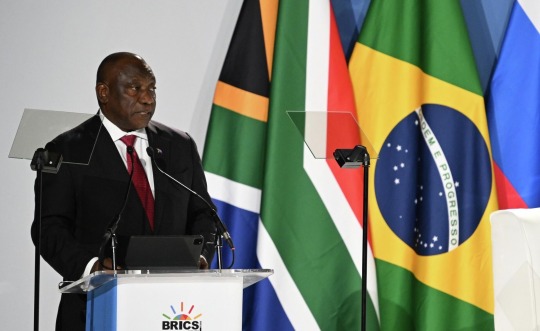
South African President Cyril Ramaphosa Delivers a Speech at the 15th BRICS Summit in Johannesburg, South Africa. © Sputnik/Grigory Sysoev/Go to the Mediabank
While Russian President Vladimir Putin's in-person absence due to international legal troubles looms over the BRICS conference attended by the leaders of fellow member states Brazil, India, China and South Africa, the growing interest in expanding the group to include additional countries from across the globe is likely to cement the bloc's future as a force in global geopolitics.
And with no seat at the table for the United States, the three-day summit that began Tuesday in Johannesburg demonstrates how Washington has struggled to project influence throughout the vast, developing Global South.
"The U.S. is trailing countries such as Russia, India and China in the Global South," Akhil Ramesh, a senior fellow at the Hawaii-based Pacific Forum, told Newsweek. "The Global South does not have this special solidarity it has with nations such as China and India. As victims of Western imperialism/colonialism and having faced similar challenges in reconstruction and development, they have a unique solidarity."
"The U.S. approach continues to be one where they use nations of the Global South as pawns in their future, larger cold/hot conflict with China or Russia," Ramesh added. "This understandably has not helped them win friends."
Such solidarity continues to extend to Putin, who has accelerated his country's outreach to developing nations, especially in Africa, in recent years.
Moscow's overtures have been met with ongoing interest, as evidenced by the recent Russia-Africa Summit in Saint Petersburg. The summit was attended by 16 African heads of state and representatives of 25 additional African countries, even as the West has accused Putin of war crimes, resulting in an International Criminal Court warrant, and of weaponizing food by bombing grain infrastructure and allowing a deal that safeguarded the continued export of Ukrainian grains via the Black Sea to collapse.
U.S. warnings about forging closer economic ties with China have been met with even stiffer resistance, as President Xi Jinping presses on with his ambitious Belt and Road Initiative extending across continents despite a slowing economy at home.
Ramesh argued that nations of the Global South simply "do not view Beijing and Moscow the same way the West does," and instead see new opportunities where traditional mechanisms have failed.
"So, when there was a group presenting an alternative to the Western-led world order/vision of the world," he added, "nations were quick to jump on the bandwagon."
Newsweek has reached out to the U.S. State Department for comment.
Still, obstacles to progress exist within a bloc whose core members already have little alignment in their broader geopolitical goals, while some, especially China and India, have active disputes between them. Such feuds have the potential to only grow as the coalition considers taking on new members, such as Iran and Saudi Arabia.
Others who have applied include Algeria 🇩🇿, Argentina 🇦🇷, Bahrain 🇧🇭, Bangladesh 🇧🇩, Belarus 🇧🇾, Bolivia 🇧🇴, Cuba 🇨🇺, Egypt 🇪🇬, Ethiopia 🇪🇹, Honduras 🇭🇳, Indonesia 🇮🇩, Kazakhstan 🇰🇿, Kuwait 🇰🇼, Morocco 🇲🇦, Nigeria 🇳🇬, the Palestinian National Authority 🇵🇸, Senegal 🇸🇳, Thailand 🇹🇭, the United Arab Emirates 🇦🇪, Venezuela 🇻🇪 and Vietnam 🇻🇳, according to the most recent count offered last week by South African Foreign Minister Naledi Pandor.
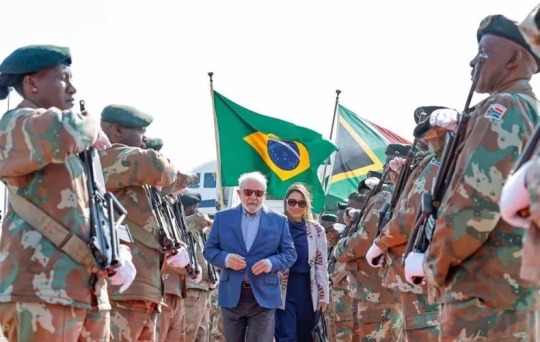
Brazil, Lula, arrives, BRICS, summit, South, Africa! Brazilian President Luiz Inácio Lula da Silva arrives in Johannesburg, South Africa ahead of the 15th BRICS summit. The leaders of 67 countries have been invited to join the forum led by Brazil, Russia, India, China and South Africa. Ricardo Stuckert/Presidency of The Federative Republic of Brazil
"Those who are there for the day-to-day negotiations, at least from the Brazilian government side, say it is already very hard to come to consensus when you have China, India and Russia at the table," Ana Elisa Saggioro Garcia, a professor at the Pontifical Catholic University of Rio de Janeiro's Institute of International Relations and general coordinator of the BRICS Policy Center, told Newsweek.
But "there's another side of the story," she said. That's the growing view, including from Brazilian President Luiz Inácio Lula da Silva, that "a strong BRICS" is necessary, and a "strong BRICS is also a big BRICS."
South Africa, the current chair, is the only nation to have been added to what began as an informal BRIC bloc, born out of a term coined by then-Goldman Sachs chief economist Jim O'Neill in 2001 to describe emerging economic powers. Russia led the initiative to bring Brazil, China and India together for the first summit in 2009, and South Africa was admitted the following year.
Initially, BRICS was focused on effecting reform within existing, primarily Western-led economic institutions, such as the International Monetary Fund (IMF), in the wake of the 2008 global financial crisis.
"The first common agenda that they had, despite their differences, was the reform of the international financial architecture," Garcia said. "So, international financial institutions, those grounded in the Bretton Woods Conference, in the post-war period, they do not represent the world anymore. Those huge economies don't have enough voice in those institutions, they need to be reformed. They need to reflect the new configuration of the world economic power."
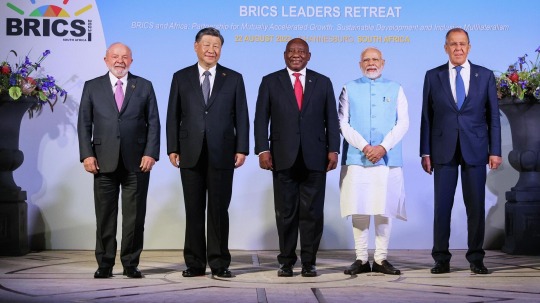
© Russian Ministry of Foreign Affairs/Go to the Mediabank
Gradually, the group became more focused on creating alternative mechanisms, most notably in the establishment in 2014 of the Shanghai-based New Development Bank, which today also counts Bangladesh, Egypt and the United Arab Emirates as members. With this transformation, Garcia explained, "the geopolitical character of BRICS started to be more important and more relevant than only the economic one."
China, in particular, she argued, "has been very clever and very strategic to use this opportunity to advance and to expand another coalition where China is predominant, where China doesn't have to deal with negotiations with Western powers."
But as evidenced by Brazil's enthusiasm for a more active role for BRICS and the growing list of prospective members, it's not all about Beijing.
"BRICS has become this pole of attraction of all countries now who've seen that they can have more power if they ally with a coalition such as BRICS to face measures that the West has been doing for years now," Garcia said, "and also to face these sorts of constraints and repression in terms of worldview and values."
Ryan Berg, director of the Center for Strategic and International Studies' (CSIS) Americas Program in Washington, D.C., also discussed how countries like Brazil were becoming more interested in the geopolitical nature of BRICS as an exercise in "active nonalignment."
"It can heighten the relevance of a country like Brazil, which is sometimes overlooked and feels overlooked and neglected," Berg said in response to Newsweek's question during a CSIS call held in the leadup to the BRICS summit.
"By pursuing this strategy," he explained, "you can basically make it a competition for the affection or for the attention of major world powers or leading world powers that would otherwise overlook Brazil's position on a particular issue."
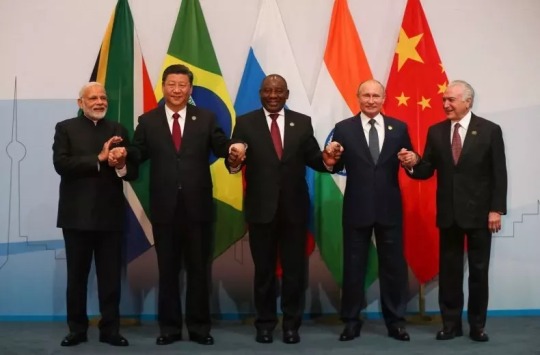
BRICS, Summit, South, Africa, 2018! (Left to right) Indian Prime Minister Narendra Modi, Chinese President Xi Jinping, South African President Cyril Ramaphosa, Russian President Vladimir Putin and then-Brazilian President Michel Temer pose for a group picture during the 10th BRICS summit on July 26, 2018 at the Sandton Convention Centre in Johannesburg, South Africa. South Africa's most populous city against hosts the BRICS summit in 2023, after each of the other four members hosted gatherings, three of which were virtual due to the COVID-19 pandemic. Mike Hutchings/POOL/AFP/Getty Images
Speaking on the same call, CSIS Africa Program director Mvemba Phezo Dizolele highlighted the importance of the host nation itself, saying BRICS membership "strengthened the position of South Africa among non-aligned countries" at a polarizing time in global geopolitics.
"Non-aligned countries have absolutely been at odds at least with Western countries, particularly ideologically because they do not want to align either with the Russians or with the United States and allies," Dizolele said.
A key goal for the summit's participants "will be discussing their disillusionment with U.S. leadership or at least the U.S.-led coalition around the world and how that world order is affecting adversely the countries of the Global South," he said, noting that "this will be a time when they will be seeking an alternative to that power."
The phenomenon of a competition among major powers to court the Global South was also observed by Mrityunjay Tripathi, a research fellow at the New Delhi-based Public Policy Research Center who previously served as part of India's delegation to the 2018 BRICS Youth Summit in South Africa.
"U.S. attempts to engage the Global South will only benefit the region, as the U.S. will act as a balancing power in the region dominated by China," Tripathi told Newsweek. "This competition will only benefit the developing economies and the multipolarity of the BRICS will ensure that region remains free and open to all."
Here, he said that "the presence of India adds credibility to BRICS and assures the West that India will act as a balancing power in the alliance that consists of Russia and China."
While New Delhi and Washington have strengthened ties in recent years, this does not mean total alignment in their positions. Tripathi argued that the trends apparent in the summit and context surrounding it show that Washington was on the backfoot in this competition over developing nations.

BRICS, Business, Forum, meets, in, South, Africa! (From left to right) Shaogang Zhang, vice chair of China's Council for the Promotion of International Trade, Onkar Singh Kanwar, chair of the BRICS Business Council's India chapter, Sergei Katyrin, chair of the BRICS Business Council's Russia chapter, José Serrador, chair of the BRICS Business Council's Brazil chapter, Busi Mabuza, chair of the BRICS Business Council's South Africa chapter, and Nozipho Tshabalala, CEO of the Conversation Strategist, attend a panel discussion during the 2023 BRICS Business Forum in Sandton, north of Johannesburg, South Africa, on August 22. Gianluigi Guercia/AFP/Getty Images
"The growing interest in BRICS does suggest that the U.S.' attempts to assert influence, particularly across the Global South, have not always produced desired results," Tripathi said. "The rise of BRICS is indicative of a shift in power dynamics from the traditionally Western-dominated world order to a more multipolar global scenario."
A key part of this shift identified by Tripathi was not only expansion, but the vision of "instituting a common currency," something that "further solidifies the group's commitment to long-term sustainable progress of the Global South."
"A common currency will not only boost intra-BRICS trade," he added," but also eliminate the high dollar conversion costs of international transactions."
Shen Shiwei, a journalist and analyst with a background in Chinese business dealings in Africa and the Middle East, argued that "the only thing that can beat the U.S. dollar is the dollar itself, driven by weaponization from Washington."
"The global trend of increasing the use of multiple currencies, instead of fully relying on U.S. dollars, is not a new idea," Shen told Newsweek. "Three decades ago, the euro was created in part because the majority of the EU wanted to move away from its deep reliance on the U.S. dollar."
"The dollar is still essential to global investments and trade," he added, "but the process of de-dollarization is accelerating, mainly because its weaponization has caused an erosion of confidence and alerted emerging economies to take actions to safeguard economic security."

People walk past a banner outside the venue for the 2023 BRICS Summit at the Sandton Convention Centre in Sandton, Johannesburg, on August 20. The BRICS countries, an acronym of the five members Brazil, Russia, India, China and South Africa, meet for three days for a summit in Johannesburg from August 22-24. Gianluigi Guercia/AFP/Getty Images
The U.S. dollar continues to command a significant lead against competitors, comprising some 59 percent of the world's foreign exchange reserves. The euro constitutes around 20 percent, with other currencies such as the Japanese yen, the United Kingdom's pound sterling and the Chinese renminbi in the single digits.
Still, a number of countries, particularly members of BRICS, have called for conducting bilateral trade in their own national currencies, and the idea of a common currency has been increasingly put forth. In April, Lula delivered an impassioned speech at the New Development Bank headquarters in which he railed against the notion that "all countries are forced to do their trade backed by the dollar."
The message has continued to gain traction among existing and prospective BRICS members.
"But that doesn't mean BRICS is anti-West," Shen said.
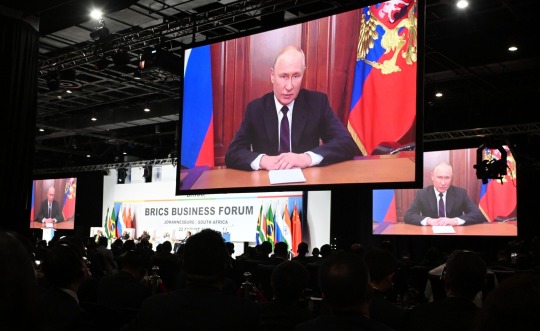
Russian President Vladimir Putin addresses BRICS summit in South Africa, August 22, 2023. © Sputnik/Grigory Sysoev
He argued that "the zero-sum game narrative developed in the West that the BRICS was created as competition to the G7 or the Global North is very misleading."
The G7, officially the Group of Seven, is a bloc consisting of the world's largest developed economies, including Canada, France, Germany, Italy, Japan, the United States and the U.K., with participation from the European Union as well. The G7 existed as the G8 until 2014, when it was expelled due to its role in the first major outbreak of conflict in Ukraine.
"All BRICS members have important political and economic cooperation with the G7 countries," Shen said. "More importantly, BRICS doesn't want to copy the Western hegemony in mentality and reality, which has brought too many problems to the Global South."
As opposed to the G7, "the BRICS mechanism has met the demands of the Global South, especially marginalized countries, to advance a collective agenda and push the building of a more inclusive, representative, just and fair global architecture," Shen argued.
"BRICS is not an exclusive club or small circle," he added, "but a big family of good partners."
#World 🌎#BRICS#Global South#United States 🇺🇸#Vladimir Putin#Russia 🇷🇺 | Brazil 🇧🇷 | India 🇮🇳 | China 🇨🇳 | South Africa 🇿🇦#Western Imperialism/Colonialism#Russia-Africa Summit | Saint Petersburg | Russia 🇷🇺#Beijing | Moscow#President Xi Jinping#Akhil Ramesh | Hawaii-based Pacific Forum#Ana Elisa Saggioro Garcia | Professor | Pontifical Catholic University of Rio de Janeiro#Shanghai | New Development Bank#Ryan Berg | Center For Strategic and International Studies' (CSIS) | Americas Program in Washington D.C.#CSIS Africa Program | Mvemba Phezo Dizolele#Disillusionment with U.S. | Leadership | U.S.-led World’s Coalition#Mrityunjay Tripathi | New Delhi | Public Policy Research Center#European Union 🇪🇺#G7 | G8#UK 🇬🇧 | Ukraine 🇺🇦#Japanese Yen#US 🇺🇸 Dollar | United Kingdom 🇬🇧 Pound Sterling#Shen Shiwei | China | Africa | Middle East
0 notes
Text

FISA: Unraveling the Military Coup – Trump’s Treason Call
The Foreign Intelligence Surveillance Act (FISA) is no longer just a tool for foreign surveillance. It’s the key to exposing the darkest coup in American history. President Trump’s bold declaration: “It’s TREASON,” has sparked a firestorm, pointing to forces within the government using FISA for their agenda—against you, the American people. They never expected this to come to light, but now it’s all unraveling.
3.4 million warrantless searches. That’s what the FBI did to Americans in 2021. No oversight, no transparency—just raw power. They hijacked FISA, originally intended to spy on foreign entities, and turned it on innocent citizens. It’s a massive invasion of privacy, but it doesn’t end there. This is about control, about silencing dissent, and yes, about installing their puppets in place of real patriots. Think back—who ordered these searches? Who benefits from this totalitarian abuse?
The Flynn factor. They tried to destroy him, but why? What did General Flynn know that made him a target of FISA? Trump’s inner circle was never just about politics; it was a battle for control over America’s soul. The FISA warrants weren’t just about Flynn. They were about dismantling Trump’s influence and crushing anyone who dared to resist.
QAnon warned us. The signs were always there. Every cryptic message, every drop hinted at FISA’s role in this covert war. FISA is the hidden thread connecting corrupt global maneuvers—from the Middle East to Washington, D.C. The attempt to overthrow leaders like Bin Salman and the engineered revolutions point to FISA’s global reach. What the elite don’t want you to know is that FISA is a weapon in their game to reshape the world—and the U.S. is just one of their targets.
Military Coup in Motion? The whispers are growing louder—U.S. generals, split and at war within the ranks, may be gearing up for an internal coup. The deep state’s stranglehold on military leadership is being challenged, and the outcome could shift the balance of power forever. But don’t forget—there are white hats in the military, patriots ready to blow the whistle and reveal the plot. These patriots are gathering evidence, working behind the scenes, and preparing to expose the deep state’s crimes at the 11.3 moment.
Blinken’s tangled web. White hats have him in their sights. His ties to Obama and secret dealings with Iran paint him as a key player in the shadow government’s plans. Did you know? Blinken was at the center of the fake Osama Bin Laden operation. The revelations to come will rock the establishment, implicating him in high treason.
It all leads back to the Biden Crime Family. Hunter’s dirty deals, the Biden’s criminal empire—it's all coming out. But it’s not just about corruption; it’s about national security. Hunter’s laptop holds classified military secrets. The elites thought they could bury this, but the truth is about to explode.
Stay tuned. The storm is brewing. 🤔
#pay attention#educate yourselves#educate yourself#knowledge is power#reeducate yourself#reeducate yourselves#think about it#think for yourselves#think for yourself#do your homework#do some research#do your own research#do your research#ask yourself questions#question everything#news#intel drop#the storm#be ready#be prepared#government corruption
122 notes
·
View notes
Text
Seventy-seven Nobel laureates have signed a letter urging the US Senate to reject Robert F Kennedy Jr as Donald Trump’s nominee for health and human services secretary, arguing that he is unfit and would put American public health “in jeopardy”.
It is believed to be the first time in living memory that Nobel prize winners have united against a presidential cabinet pick, and comes against a backdrop of Kennedy’s public support for discredited theories, including a claim that childhood vaccines cause autism.
In their letter, prize winners in the fields of medicine, chemistry, physics and economics castigate Kennedy for a “lack of credentials” and point out that he has been “a belligerent critic” of some of the agencies that he would oversee, including the Food and Drug Administration (FDA), the National Institutes of Health (NIH), and the Centers for Disease Control and Prevention (CDC). [...] “In view of his record, placing Mr Kennedy in charge of DHSS would put the public’s health in jeopardy and undermine America’s global leadership in health sciences, in both public and commercial sectors.”
Signatories include Victor Ambros and Gary Ruvkun, who won this year’s Nobel prize for physiology or medicine for their discovery of microRNA. [...] In response, a spokesperson for Trump’s transition team said: “Americans are sick and tired of the elites telling them what to do and how to do it. Our healthcare system in this country is broken, Mr Kennedy will enact President Trump’s agenda to restore the integrity of our healthcare and Make America Healthy Again.”

In response, a spokesperson for Trump’s transition team said: “Americans are sick and tired of the elites telling them what to do and how to do it." [color emphasis added]
Trump's transition team apparently sees no irony in the above statement. They are apparently clueless that RFK, Jr. is about as "elite" as one can get, being a scion of the Kennedy clan.
And aren't Elon Musk and Trump himself members of the "elite" class, not to mention the other billionaires that will have roles in the incoming Trump administration, including: Vivek Ramaswamy, Scott Bessent, Howard Lutnick, Linda McMahon, Jacob Isaacman, Warren Stephens, Stephen Feinberg, Kelly Loeffler, and Charles Kushner.
How long will it be before the average American realizes that Trump is ONLY about building an America where far-right billionaires DICTATE to the rest of us how everything in the U.S. will be.
#rfk jr#trump#77 nobel prize laurates#rfk jr is unqualified to run the nih#trump's billionaire oligarchs#trump and his inner circle are the elites#the guardian
79 notes
·
View notes
Text
The WAVES of Change: Women's Valiant Service in World War II 🌊

When the tides of World War II swelled, an unprecedented wave of women stepped forward to serve their country, becoming an integral part of the U.S. Navy through the Women Accepted for Volunteer Emergency Service (WAVES) program. This initiative not only marked a pivotal moment in military history but also set the stage for the transformation of women's roles in the armed forces and society at large. The WAVES program, initiated in 1942, was a beacon of change, showcasing the strength, skill, and patriotism of American women during a time of global turmoil.

The inception of WAVES was a response to the urgent need for additional military personnel during World War II. With many American men deployed overseas, the United States faced a shortage of skilled workers to support naval operations on the home front. The WAVES program was spearheaded by figures such as Lieutenant Commander Mildred H. McAfee, the first woman commissioned as an officer in the U.S. Navy. Under her leadership, WAVES members were trained in various specialties, including communications, intelligence, supply, medicine, and logistics, proving that women could perform with as much competence and dedication as their male counterparts.

The impact of the WAVES program extended far beyond the war effort. Throughout their service, WAVES members faced and overcame significant societal and institutional challenges. At the time, the idea of women serving in the military was met with skepticism and resistance; however, the exemplary service of the WAVES shattered stereotypes and demonstrated the invaluable contributions women could make in traditionally male-dominated fields. Their work during the war not only contributed significantly to the Allies' victory but also laid the groundwork for the integration of women into the regular armed forces.

The legacy of the WAVES program is a testament to the courage and determination of the women who served. Their contributions went largely unrecognized for many years, but the program's impact on military and gender norms has been profound. The WAVES paved the way for future generations of women in the military, demonstrating that service and sacrifice know no gender. Today, women serve in all branches of the U.S. military, in roles ranging from combat positions to high-ranking officers, thanks in no small part to the trail blazed by the WAVES.


The WAVES program was more than just a wartime necessity; it was a watershed moment in the history of women's rights and military service. The women of WAVES not only supported the United States during a critical period but also propelled forward the conversation about gender equality in the armed forces and beyond. Their legacy is a reminder of the strength and resilience of women who rise to the challenge, breaking barriers and making waves in pursuit of a better world.
Read more: https://prologue.blogs.archives.gov/2023/11/06/historic-staff-spotlight-eunice-whyte-navy-veteran-of-both-world-wars/
212 notes
·
View notes
Text
We know that both good actors and bad actors around the world observe the United States and the strength of its leadership, and are influenced in their decisions by what they see. A United States that looks weak and disoriented is globally dangerous, and that is what we have had for the last 4 years. It is not hard to see some connection between the chaos around the world, and the bizarre, unprecedented condition of the executive branch of the U.S. government.
I am not a hard core foreign interventionist. It is the fact that parties around the world are concerned about what the United States may do that influences events around the world. Rather than permitting a crisis that we actually have no desire or plans to intervene in, we can diffuse that crisis with a show of diplomatic strength and leadership. Leveraging uncertainty about how far we are willing to get involved as a kind of soft power for negotiation has been a valuable tool of the presidency, and it is one that I believe this administration has severely squandered.
69 notes
·
View notes
Text
Since the start of the Israel-Hamas war, the Biden administration has tried to toe a delicate line: backing Israel’s war against the group in Gaza, while pushing Israel to ease the humanitarian toll of its operations and take the Palestinians’ legitimate political grievances seriously. By all accounts, toeing this line has been a frustrating and thankless endeavor—and, increasingly, a lonely one. Today, even the United States’ closest allies are calling for an “immediate ceasefire” that would put an end to Israel’s operations in Gaza. At home, the White House is facing increasing pressure from Democrats in the U.S. Congress and parts of the Democratic base to change its current tactics in dealing with Israel.
And yet, what the Biden administration understands—and what Israel’s many critics miss—is that the international community cannot dictate a solution to Israel-Hamas war by fiat. If the international community wants Israel to change strategies in Gaza, then it should offer a viable alternative strategy to Israel’s announced goal of destroying Hamas in the strip. And right now, that alternate strategy simply does not exist.
There is a brutal logic to Israel’s actions in Gaza. By its own estimates, Israel has destroyed three-quarters of Hamas’ battalions and killed two of five brigade commanders, 19 of 24 battalion commanders, more than 50 platoon leaders, and 12,000 of Hamas’ 30,000 foot soldiers. American intelligence estimates are lower, but not by much: Between 20 to 30 percent of Hamas’ fighters and 20 to 40 percent of its tunnels are estimated to have been destroyed as of mid-January. It’s also worth remembering that Hamas is structured more like a conventional military than a pure terrorist group. As a rule of thumb, conventional forces are considered combat ineffective once they lose more than 30 percent of their strength and destroyed once they lose 50 percent.
Even if Israel does not stamp out Hamas entirely but merely succeeds in driving it out of power and underground, from Israel’s view, that is still a win—even if stops well short of its goal of destroying the group, for doing so would likely prove sufficient to prevent Hamas from launching another 3,000-man complex assault like the one Israel saw on Oct. 7. Finally, it’s worth remembering that it took the United States several years to defeat the Islamic State. Israel is just over five months into what its leaders promised will be a very long war.
To be sure, there are serious drawbacks to the Israeli approach. This war will encourage long-term radicalization of the Palestinian population, damage Israel’s relationship with its Arab neighbors, and tarnish Israel’s global reputation in a pretty serious way. Yet all of these problems are long term. Too often, states and politics live in the here and now.
At the same time, Israel’s critics have failed—and continue to fail—to offer a coherent alternative way forward. Instead, more often than not, there are vague references for the need for some ill-defined “political solution” to the conflict. To the extent that there is a coherence to this alternate strategy, it revolves around using the threat of diplomatic isolation alongside economic threats that might force Israel to agree to an “immediate ceasefire.” That ceasefire, in turn, would pave the way for a longer-term political settlement, likely around a two-state solution. Problem solved. Or not.
For starters, international pressure and sanctions will not likely compel Israel to compromise. Israelis from the leadership on down are keenly aware that their country was born out of the ashes of Holocaust as a safe-haven for Jews after millennia of persecution. Israel then spent its first quarter-century fighting for its very existence. The idea that the world is aligned against Israel is deeply embedded in the nation’s collective DNA, and chants of “from the river to the sea,” coupled with surging global antisemitism, only ensure that those fears remain very much alive today.
Economic pressure—such as sanctioning settlers or restricting military aid—is unlikely to work, either. In general, sanctions have a poor track record of compelling states to abandon core national security interests. And given the Oct. 7 attacks, this war is nothing if not a core national security interest for Israel. Even if pressure did work initially, for a political solution to be sustainable, Israelis must voluntarily agree, not be pressured into it.
But let’s just say, for the sake of argument, that Israel caved to outside pressure and agreed to an immediate ceasefire. What would the day after look like? Hamas—as Israel and Hamas both acknowledge—would be left with a considerable military force, numbering in the thousands. Israel would then need to engage in another very lopsided deal to free the remaining hostages. In early February, Hamas wanted 1,500 prisoners freed from Israeli jails, including at least 500 serving life sentences for murder and other crimes, in exchange for the hostages.
So, at minimum, the group’s ranks would soon swell. And invariably, some of those released would be quite dangerous. After all, Yahya Sinwar—the head of Hamas in Gaza and alleged mastermind of the Oct. 7 attacks—was freed from an Israeli prison, where he was serving a life sentence for murder, in the 2011 trade of 1,027 prisoners for one captured Israeli soldier, Gilad Shalit. None of this recent history bodes particularly well for long-term peace.
In all likelihood, Israel would respond to a ceasefire by tightening its blockade of Gaza, citing Hamas’ continued existence as one reason for doing so. In particular, Israel would likely put severe limits on the quantities and types of building materials allowed into the Strip. After all, Hamas diverted an estimated 1,800 tons of steel and 6,000 tons of concrete to build its tunnel networks, and Israel would not want to see them rebuilt. The net consequence would be that desperately needed reconstruction would be severely delayed or even brought to standstill.
The fighting would not stop, either. Fearing that Hamas will make good on its promise to repeat the Oct. 7 attack “again and again,” Israel would step up its preemptive strikes on Gaza and the West Bank, particularly whenever it got the first whiff that Hamas might be planning an attack. At the same time, Hamas would continue to attack Israel, if only to reinforce its legitimacy and divert attention away from the likely dismal conditions in Gaza (thanks, in no small part, to the stymied reconstruction effort). In all likelihood, the situation would be right back where it started.
Ah, but wait: Won’t a two-state solution solve this? Probably not. Even before Oct. 7, the majority of Israelis didn’t believe in a two-state solution, or that peace was even possible. There are likely even fewer who believe that now, especially if a Palestinian state were to include Hamas in some form. Consider how unfathomable it would have been for most Americans to support the creation of a state with al Qaeda at its helm just five months after 9/11. There is no reason to believe that the Israeli public should be any different. Given considerable support for Hamas among the Palestinian population, it would be politically impossible to exclude Hamas from a new, democratic Palestinian government. And even if the new state’s government is less than democratic, it would have trouble excluding Hamas entirely—even if it wanted to—if the group still has thousands of men under arms.
But even assuming that overwhelming international pressure forced Israel to agree to a two-state solution, it’s not going to guarantee peace in the short or medium term. There are still a host of thorny issues—including borders, water rights, air rights, the demilitarization of the Palestinian state, and the partition of Jerusalem—that would need to be resolved before a second state could come into being. Then there is the problem that only one-third of Palestinians favor a two-state solution themselves, and nine in 10 don’t trust the Palestinian Authority. For its part, Hamas has made it abundantly clear that it wants one state without Jews under an Islamist banner. None of this means that the international community shouldn’t push for a political settlement, but this is at best a long-term solution, not a near-term fix.
If a two-state solution did come about, it may not bring an end to hostilities. Two states did not solve hostilities between India and Pakistan, or North and South Korea, or North and South Vietnam. Israel would be under no obligation to grant Palestinians—now citizens of a separate country—workers’ permits, which would likely tank the nascent state’s economy, just as it wouldn’t have to provide electricity and other services to Gaza, as it did before the war. At the same time, Palestinians would rightly wonder why their state should be demilitarized and not entitled to the sovereign privileges of a “normal state.” There would perhaps still be Jewish settlers living on the territory of the new Palestine, creating all sorts of problems. Absent genuine buy-in from both sides, a two-state solution would simply turn a local conflict into an international one.
There is a lot to hate about Israel’s war in Gaza. It is a bloody, destructive war that has killed far too many innocents and upended far too many civilian lives. It is by any measure a human tragedy that will reverberate across the region for years to come. But if the international community is not simply grandstanding and actually hopes to solve the tragedy playing out in Gaza, then it needs to begin by offering feasible solutions that address both Palestinian grievances and Israeli security concerns.
To its credit, the Biden administration is at least trying to move in this direction. It is pushing Israel to curtail civilian casualties, set up safe zones, increase humanitarian aid, and move to a longer-term political solution—all while still backing (or at least not outwardly opposing) Israel’s ongoing operations to root out Hamas. Some might call such a balanced approach overly tactical and unable to quickly end the war, but a good strategy is built on sound tactics.
Unfortunately, the Biden administration’s nuance is the exception both internationally and in the domestic debate over U.S. policy. Just as the political right needs to be continuously reminded that the Palestinian population is not going anywhere and Israel cannot kill its way to victory, the political left needs to be reminded that Israelis are also not going anywhere and their equities must also be taken seriously.
Ultimately, if Biden’s critics on the political left want a different war, then they need to offer an alternative strategy and subject that strategy to the same sort of analytical rigor that it trains on Israel’s current military effort. If not, the brutal logic of the current war will remain, and the ongoing tragedy will continue.
207 notes
·
View notes
Text
Reveals Predictions For ELECTION, WAR & HUMANITY’s Future in 2025! (Tone: 310)
Predictions for 2025 warn of potential conflict and political shifts. Discover how spiritual alignment might impact humanity’s future. #FuturePredictions #SpiritualGuidance
Posted by @LifeAfterLifeNDE-is1kh ABOUT THIS VIDEO: This video features Sally Reid, who describes her transformative near-death experiences (NDEs) and subsequent encounters with spiritual beings. Through these experiences, she receives insights and warnings regarding humanity’s future, including predictions about potential conflict, political changes, and the evolution of global leadership. Her…

View On WordPress
#2025 predictions#2025 U.S. election#civil conflict warning#civil war#conflict prevention#election outcome prediction#female leadership#future of humanity#global peace#Global Stability#higher beings#humanity’s future#Kamala Harris prediction#NDE predictions#near-death experience#peace predictions#Sally Reid#spiritual alignment#Spiritual Guidance#Spiritual Insights#spirituality#U.S. conflict#U.S. political predictions#World War III risk
0 notes
Text
The Rise of Tech Giants: How Countries Compete for Innovation Supremacy
The Rise of Tech Giants: How Countries Compete for Innovation Supremacy #Chinainnovation #emergingtechnologies
#China innovation#emerging technologies#EU digital regulation#global tech competition#India tech hub#South Korea electronics#technology supremacy#U.S. tech leadership
0 notes
Text
In a recent report published by Open Research Africa discussing disparities in Covid-19 research funding and leadership, scientists revealed that the majority of Long Covid research in Africa is primarily financed and overseen by foreign nations. The report’s authors analyzed projects documented in a global database tracking funded Covid-19 research projects. Out of a staggering 17,995 research projects cataloged in the Tracker as of July 2022, only 786 were carried out in African countries. Noteworthy contributors to Covid-19 research efforts on the continent included Morocco, with 183 projects, South Africa with 128 projects, and Kenya with 91 projects. In total, 75 research funders representing 17 countries directed USD $267 million to Covid-19 research in Africa. But the funders of these projects were predominantly public or governmental organizations from Europe and the U.S. Institutions such as the National Center for Scientific and Technical Research and UK Research and Innovation led the charge. While the bulk of funding stemmed from international entities, nine funders based in Africa also contributed to the cause. This imbalance in research investments poses a challenge for African scientists, as local research needs may differ from external agendas. The lack of sufficient evidence produced within and in the context of Africa worsens the marginalization of Long Covid in the region and weakens attempts to advocate for its acknowledgment and management.
110 notes
·
View notes
Text

I've been asked to share my opinion on the recent Economist magazine cover that depicts a very interesting symbolic collage type of image. In no particular priority order, here are my impressions:
1. Saturn, which has profound occult meaning, sits atop the world order, above all world leaders and changing international dynamics. They are saying that regardless of changing conditions in the world ultimate authority will remain with Saturn and the cult of Saturn.
2. The image is dyed with black and red which is especially significant in 2025 because black is the traditional color of Saturn and red is the classical color of Aries where Saturn is heading in 2025. In other words, the dominant colors of the image reflect Saturn's astrological entry into Aries next year which the "elites" are aware of and planning with (Saturn centric strategy).
3. The value of the U.S. dollar will rise, perhaps as sharply as a rocket, through President Trump's leadership. Currency speculators should take this very seriously as I believe he's on a mission to save the USD through extraordinary means and measures like gold.
4. Zelensky holds the lowest hierarchical rank within the image which resonates with my recent prediction that 'Zelensky the Aquarius' will be falling after the next new moon in Aquarius which comes on January 29th, 2025.
5. Nuclear and radiological imagery conveys the message of crisis of this nature that dark forces intend to amplify and exploit to negatively change power dynamics within the world. The eye with the radiation symbol correlates with Pluto's entry into Aquarius.
6. The other eye to the right appears to be the same from the pyramid on the USD, an easy read here is "watch what we do with the USD" which has of course been used as an economic weapon for a long, long time. President Trump can 'game change' this with gold. The hour glass next to the 'dollar eye' says that the dollar will have more time or that the clock on it will be refreshed.
7. The Japanese Yen appears forecasted (or plotted) to decline along with the power and influence of Ursula Von Der Leyen who is likely to be axed by Saturn in '25.
8. There is a certain city beneath Saturn that seems unaffected in a negative way, a city above President Trump and perhaps the USA which he represents. The "City of Saturn" is a concept that should be kept in mind, especially a new "City of Saturn" as Saturn will be transitioning into Aries, the house of all things new.
9. President Putin, the great Christian hope and power of the East, is placed beneath a globe showing his region in emergency red beside a syringe which inclines me to think of a new biological threat in his area. I pray that his new cancer vaccine hasn't been tampered with.
10. EV battery supply issues also appear forecasted, with Saturn entering Aries battles for land, territory and raw materials will definitely be intensifying globally.
11. The white rocket next to President Trump seems to be an admission that 'Trump world' will be taking off. The rocket can also symbolize @elonmusk who has (thank God) propelled President Trump's ambitions.
12. The red communist fist at the bottom of the image implies a series weakening of communist social power.
13. I'm not quite sure who the woman is at the bottom but I feel inspired to think of Marine Le Pen as a new power player on the global chessboard. Watch her.
14. Xi and Putin are 'to the right' of Saturn (implying that they are philosophical good actors) while Ursula and Zelenksy are 'to the left' of Saturn (implying that they are bad actors). Trump is in the middle, between worlds, where he'll be tested in his 'bridge making' ability in '25.
15. The eyes to the left and right of Trump convey a message that he is being watched in an "all seeing" manner by shadow powers. Saturn above Trump, in a 'third eye' position, inspires me to think that he has a blind spot for Saturn, especially the astrological Saturn, which he should learn to see through his inner eye.
16. President Xi is depicted with a higher status than President Trump although the imagery near Trump implies a 'rise to the occasion' type of momentum and challenge that Trump will pose to Xi and China in economic terms. Between this and the Yen decline imagery I get chills for the Asian market in general.
17. Imagery for the secret AI arms race is suspiciously missing although the text reads, "crunch year for AI, will the $1T gamble pay off?" In other words, look at this and look at that but don't think of the secret AI arms race.
In closing I must state, as I have repeatedly through the years, that 'world elites' use astrology in secret and here they are putting Saturn at the top of their 2025 agenda.
Watching wisely,
Astrologer Salvador Russo
It's a pretty good description 🤔
#pay attention#educate yourselves#educate yourself#reeducate yourselves#knowledge is power#reeducate yourself#think about it#think for yourselves#think for yourself#do your homework#do your own research#do research#do some research#ask yourself questions#question everything#astrology#you decide#decode#interesting
42 notes
·
View notes
Text
Courtney Kube, Carol E. Lee, Vaughn Hillyard, and Mosheh Gains at NBC News:
The Trump transition team is compiling a list of senior current and former U.S. military officers who were directly involved in the withdrawal from Afghanistan and exploring whether they could be court-martialed for their involvement, according to a U.S. official and a person familiar with the plan. Officials working on the transition are considering creating a commission to investigate the 2021 withdrawal from Afghanistan, including gathering information about who was directly involved in the decision-making for the military, how it was carried out, and whether the military leaders could be eligible for charges as serious as treason, the U.S. official and person with knowledge of the plan said. “They’re taking it very seriously,” the person with knowledge of the plan said. The Trump transition team did not immediately respond to a request for comment. Matt Flynn, a former deputy assistant secretary of defense for counternarcotics and global threats, is helping lead the effort, the sources said. It is being framed as a review of how the U.S. first got into the war in Afghanistan and how the U.S. ultimately withdrew.
[...] President-elect Donald Trump has condemned the withdrawal as a “humiliation” and “the most embarrassing day in the history of our country.” It is not clear, though, what would legally justify “treason” charges since the military officers were following the orders of President Joe Biden to withdraw all U.S. forces from Afghanistan.
A 2022 independent review by the Special Inspector General for Afghanistan Reconstruction blamed both the Trump and Biden administrations for the chaotic U.S. withdrawal in 2021. Trump first reached an agreement with the Taliban in 2020 to withdraw all U.S. forces from Afghanistan, roughly 13,000 troops, and release 5,000 Taliban fighters from prison. The Biden administration then completed the withdrawal and badly overestimated the ability of Afghan government forces to fight the Taliban on their own. Trump’s choice for secretary of defense, Fox News personality Pete Hegseth, has criticized the withdrawal, saying the U.S. lost the war and wasted billions of dollars. In his book “The War on Warriors,” Hegseth wrote, “The next president of the United States needs to radically overhaul Pentagon senior leadership to make us ready to defend our nation and defeat our enemies. Lots of people need to be fired. The debacle in Afghanistan, of course, is the most glaring example.”
[...] The transition team is looking at the possibility of recalling several commanders to active duty for possible charges, the U.S. official said. It’s not clear the Trump administration would pursue treason charges, and instead could focus on lesser charges that highlight the officer’s involvement. “They want to set an example,” said the person with knowledge of the plan.
NBC News is reporting that Donald Trump’s transition team is compiling a list of senior current and former US military officers who were directly involved in the withdrawal from Afghanistan to face a potential court martial.
This is a fascistic insult to common sense.
#Donald Trump#Afghanistan War#Trump Transition Team#Trump Administration II#Doha Agreement#Matt Flynn#Pete Hegseth
49 notes
·
View notes
Text
For Lula, Milei Has Gone From Being a Nuisance to Being a Problem

Brazilian President Luiz Inacio Lula da Silva has aspirations for regional and global leadership. Standing in Lula’s way is the fact that he cannot even get a meeting with his counterpart from neighboring Argentina, President Javier Milei.
Seven months after Milei’s inauguration, the two leaders have met only once and even then briefly, on the sidelines of the G7 meeting last month in Italy. Otherwise, they have unartfully dodged each other as they have darted around the region and the world promoting their opposing ideological views.
Lula’s global agenda is expansive. He wants Brazil to have a permanent United Nations Security Council seat. He plans for the country to take a leading role in climate change negotiations as he hosts the U.N. COP30 Climate Change Conference in Brazil next year. He has tried to insert himself as a mediator in the Ukraine conflict. And when BRICS—the political grouping that includes Brazil, Russia, India, China and South Africa—moved to expand last year, Lula made sure to bring along Argentina under then-President Alberto Fernandez as one of its new members.
Milei withdrew Argentina from the BRICS expansion process as soon as he took office in December. That’s consistent with his desire to move the country away from China and closer to the United States. Besides that, he has not clearly outlined an international agenda for his country. But Milei definitely has an international agenda for himself. He has portrayed himself as an ally of Israel and Ukraine, a contrast to Latin America’s left-wing leaders who have opposed the former’s war in Gaza and mainly attempted to remain neutral on the latter’s fight against Russian aggression.
Ideologically, Milei is attempting to turn himself into a global icon for free market libertarianism, speaking at conferences in South America, the U.S. and Europe, and meeting with venture capital investors and social media stars. He uses strong rhetoric in favor of capitalism and against any form of what he views as socialism or Marxism. His relatively extreme views, which only appeal to a small minority of Argentine voters who comprise his base, get him wild cheers overseas.
Continue reading.
#brazil#brazilian politics#politics#argentina#argentine politics#international politics#foreign policy#mod nise da silveira#image description in alt
59 notes
·
View notes